Protein bars are great snacks, especially when you’re on the go. But finding allergy-friendly and nut free protein bars can be a challenge. In this guide, we’ll explore what allergy friendly, nut free protein bars are available and how they stack up nutritionally.
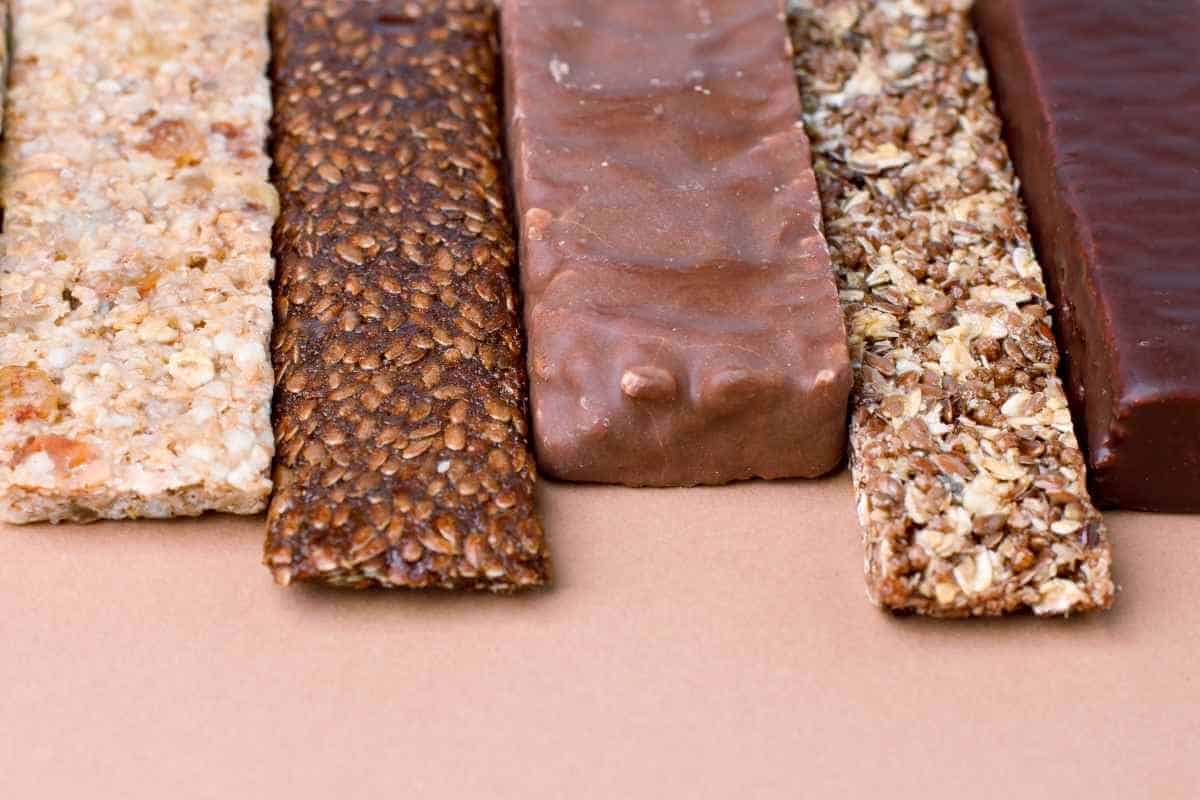
Disclosure: This post contains Amazon affiliate links and other affiliate links. As an affiliate, I earn commission on qualifying purchases.
My son recently went on a trip with his high school band to Hawaii. To get there from Minnesota is a day-long journey. Naturally, I was worried about what food options he would have given his multiple food allergies. So, I went on a quest for filling snacks, like protein bars, that he could take with him while traveling.
Jump to:
Why a protein bar?
Protein bars usually aren’t just protein but contain the other macronutrients: carbohydrates and fat. Combining all of these makes for balanced meals and snacks.
Have you ever noticed when you eat something that is just carbohydrates, like crackers, you never seem to feel full?
Carbohydrates, especially refined carbohydrates without fiber tend to be quickly digested and don’t stick with you for very long. When they’re combined with fiber, protein, and fat, it makes for a more satisfying meal or snack that has staying power.
How can I get protein without nuts?
While nuts are a good source of protein, there are many protein foods that are nut free including:
- Meat (pork, beef, poultry, etc.)
- Fish and shellfish
- Eggs
- Dairy products
- Legumes (beans, peas, lentils)
- Seeds (pumpkin, sunflower)
- Grains like quinoa and buckwheat also have complete protein
You might have noticed that many of these protein sources like eggs, soybeans, fish, shellfish, and dairy are common allergens. And many protein bars include ingredients from those foods, especially peanuts, tree nuts, eggs, soy, and dairy. This can make finding an allergy friendly option a challenge.
What to look for in a protein bar
Like most things related to nutrition, there isn’t a one-size-fits-all approach to choosing the best protein bar. Following are some things to consider when making your selection.
Ingredients and allergens
For those of us managing food allergies, ingredients are the #1 thing we’re looking at because the food has to be safe to eat, first and foremost.
Food labeling laws require that the top 9 food allergens be clearly stated on the label. So, the first thing to look at is the ingredient list and whether any of the allergens you’re avoiding are in the product.
Next, look for advisory statements (may contain traces of… or packaged in a facility with…) on the label. Whether you choose to eat something with an advisory statement for an allergen you are avoiding is a personal choice based on your comfort level. If you’re not sure, ask your allergist for guidance.
It’s important to note that my use of the term “nut free” in this article means free from peanuts AND tree nuts.
Peanut allergy and tree nut allergy are not the same but they're often lumped together. This is partly because of the often high risk of cross-contact in manufacturing of these foods.
Nutrition
I’m a Registered Dietitian so I’m always breaking down food labels but it’s not always black and white. When someone asks, “Is this healthy?” my answer is, “It depends.”
So, what does it depend on? I consider a number of things but one of the most important questions to ask is: What do you want the food to do for you?
Do you want it to give you quick energy? Do you want it to stick with you for a while? Is it purely for enjoyment? (And, by the way, that’s totally fine!)
There are lots of factors to consider.
Protein
When I’m looking for a protein bar I want it to have protein! The bars I’ve chosen for this list are not just granola bars with a gram or two of protein. They have at least 6 grams per bar and most are higher.
This can be challenging to find without nuts and other common allergens!
The source of protein is also a consideration. As mentioned above, many protein sources are common allergens. And many more aren’t necessarily common allergens but may not be suitable for you.
For example, pea protein is a common protein source in a variety of "allergy-friendly" products. It’s not considered a top allergen but if you have an allergy to other legumes like soy or peanuts, you might be avoiding it.
Carbohydrates
Carbohydrates sometimes get a bad rap but they are the body’s main source of energy. Are some carbohydrates better than others? Absolutely! Carbohydrates from whole grains like whole wheat, brown rice, and quinoa have a good amount of fiber which makes for a “slow burn”.
Refined carbohydrates without fiber burn like paper in a fire. The flame is intense at first but burns out quickly. On the other hand, complex carbohydrates with fiber burn like a big log of wood. It burns slowly and keeps the fire going longer. This is what we’re going for when we choose carbohydrate foods.
Added sugars are carbohydrates that we want to try to limit and come from ingredients like cane sugar, corn syrup, honey, and agave. Watch food labels for “contains x grams of added sugars” and keep that number as low as possible.
Fats
I have mentioned the other two macronutrients, protein and carbohydrates, so I better not leave out fat! Fat helps us feel more satisfied with meals and, let’s face it, it makes food taste better.
I look for foods that are low in saturated fats. The bars on this list all have protein from plant sources which means the fat they provide is mostly unsaturated.
Some are even good sources of omega-3s, essential fatty acids that have a number of health benefits. Omega-3s are found in fatty fish but also pumpkin and chia seeds, and several other plant sources.
Taste and texture
Just because you have food allergies doesn’t mean food shouldn’t taste good, right?! The taste and texture of bars are important factors, too.
Some protein bars are designed to be meal-replacement bars and have a large amount of isolated protein. This means the bar is essentially made to be high in protein with some sort of protein powder.
Other bars are made to be higher in protein by mixing in ingredients that are good sources of protein such as seeds. In my opinion, these tend to have a better texture that’s not chalky like those that are mostly isolated protein.
Of course, taste and texture are totally subjective. What I like might not be your cup of tea!
Are there any nut free protein bars?
Now that I’ve identified what I look for in allergy-friendly, nut-free protein bars I am happy to report that, YES, these bars exist!
Not only did I find nut free protein bars made in dedicated nut free facilities but they are also free of many of the most common food allergens! HOORAY!
5 allergy friendly nut free protein bars
I have looked carefully at the ingredient lists and manufacturing practices of these brands and am sharing what I learned here. However, ingredients and manufacturing practices change frequently so please read labels carefully to make sure they are currently safe for you.
88 Acres Protein Bars
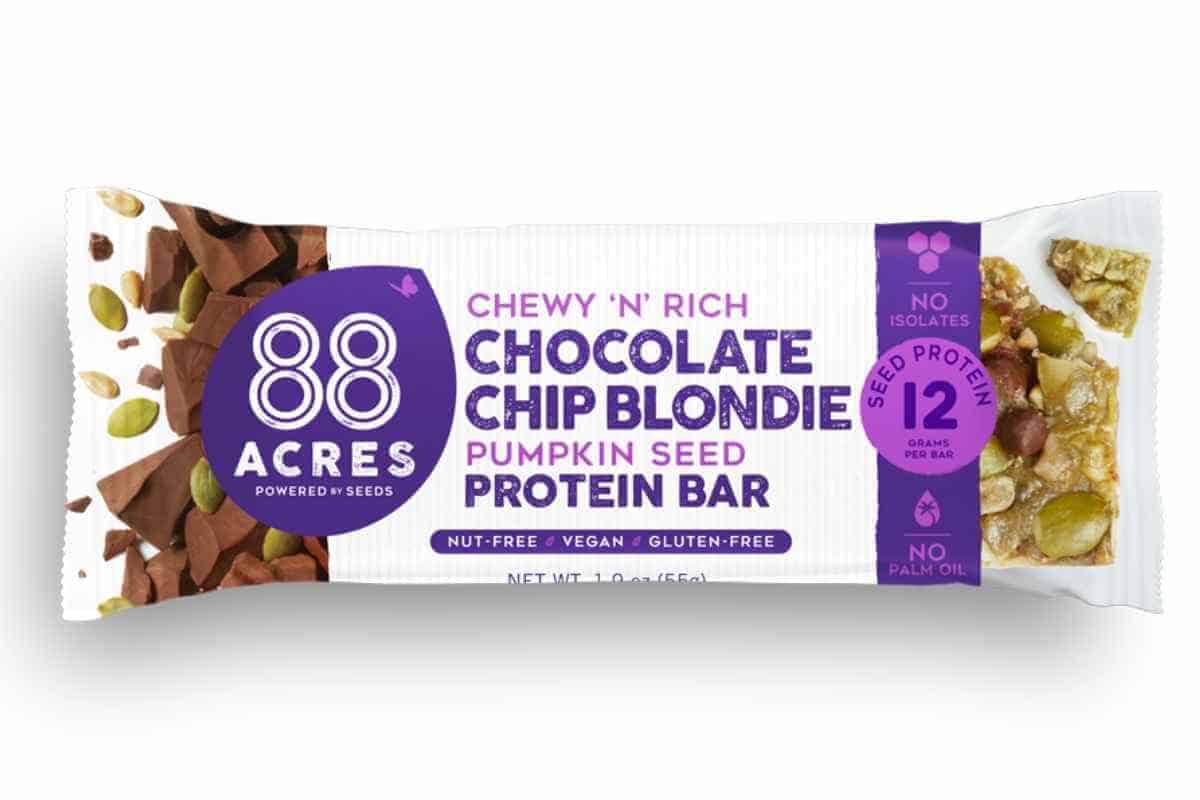
88 Acres makes a variety of delicious snacks free from common allergens including protein bars in dark chocolate, banana bread, and chocolate chip blondie.
These bars are made in dedicated nut free facilities as well as free from many other common allergens (see below for more on that).
The protein in these bars comes from pumpkin and sunflower seeds which are good sources of healthy fats.
These bars are super tasty and there are no isolated proteins so they don't have a chalky texture like some protein bars do.
- Products available: Dark chocolate, banana bread, and chocolate chip blondie protein bars. The company also makes seed bars, Seed’nola, and a variety of seed butters.
- Free from: Tree Nuts, peanuts, wheat, gluten, soy, dairy, sesame, eggs, fish, shellfish, mustard, sulfites, corn
- Contains: no major allergens
- Protein source: Pumpkin and sunflower seeds
- Other nutrition notes: Bars provide: 260-280 calories, 15 grams of carbohydrates, 3 grams of fiber, 4-5 grams of added sugar, and 12 grams of protein.
Where to buy: Shop at 88Acres.com or Amazon.
Amrita High Protein Bars
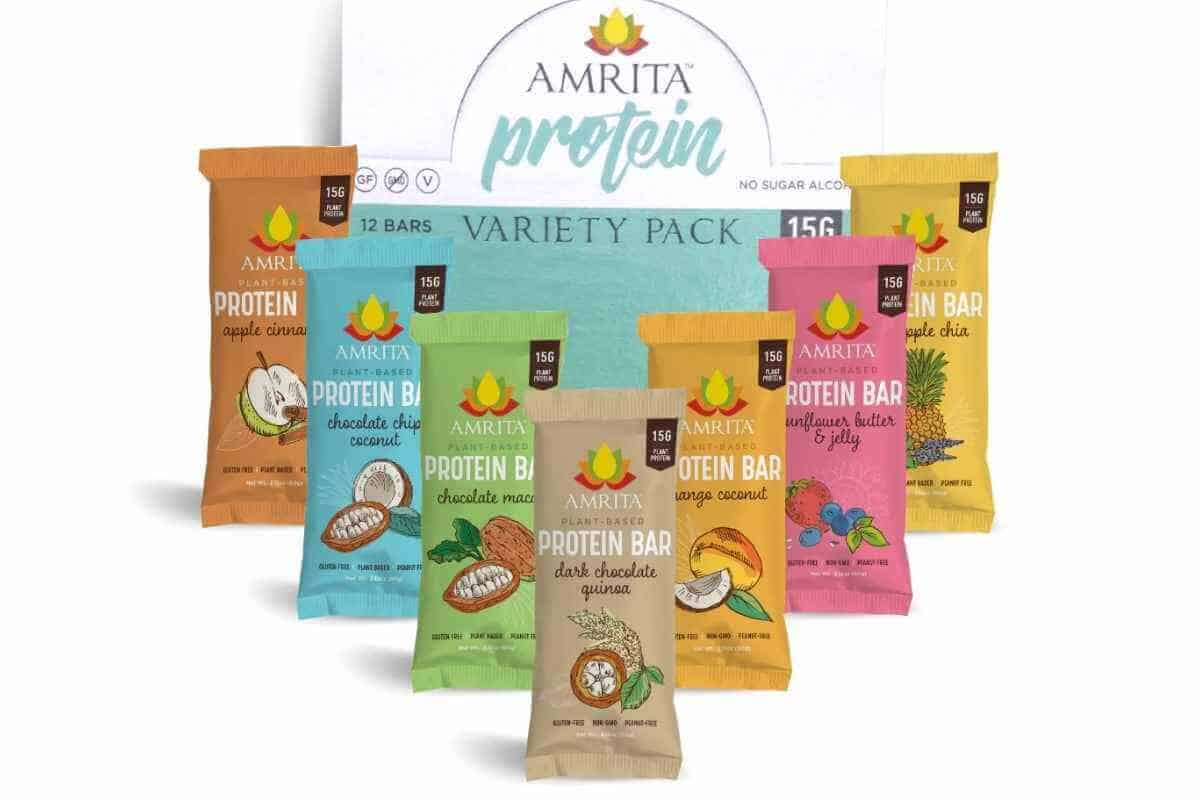
Amrita Foods makes snacks that are made with plant-based proteins, are grain free, and low in added sugars.
The protein bars are made in a dedicated facility that is free from peanuts, eggs, dairy, gluten, and soy.
They do contain coconut (considered a tree nut by the FDA), but are free from other tree nuts. With that said, it’s important to note that the label for the high protein bars includes an advisory statement, “may contain traces of tree nuts”.
I asked Amrita about this and was given the following information:
“Our facility is free from gluten, peanuts, dairy, soy, and eggs. We do have tree nuts (coconut, walnuts, pecans, almonds). We do a deep clean after any tree nut production. All tree nut ingredients are kept in a separate area of the facility to prevent any cross-contamination.”
The taste and texture of Amrita bars remind me of a Larabar - both are sweetened with dates and no added sugars. The protein source in Amrita bars is brown rice protein but it's hard to detect that there is added protein. I especially loved the chocolate maca flavor.
- Products available: protein bar varieties include chocolate chip coconut, sunflower butter and jelly, chocolate maca, apple cinnamon, dark chocolate quinoa, mango coconut, and pineapple chia. The company also offers
- Free from: Peanuts, dairy, eggs, gluten, soy.
- Contains: Coconut. The protein bars are free from other tree nuts but they are made in the same facility as other products that do contain tree nuts.
- Protein source: All of the bars contain rice protein. Other protein sources depending on the bar include pumpkin seeds, sunflower seeds, and pea protein. Some of the bars also contain chia seeds and quinoa.
- Nutrition notes: Each bar contains about 230 calories, 30 grams of carbohydrates, 4 grams of fiber, 0-2 grams of added sugars, and 15 grams of protein.
Where to buy: Shop at Amritahealthfoods.com or Amazon.
Go Raw Sprouted Pumpkin Seed Bar
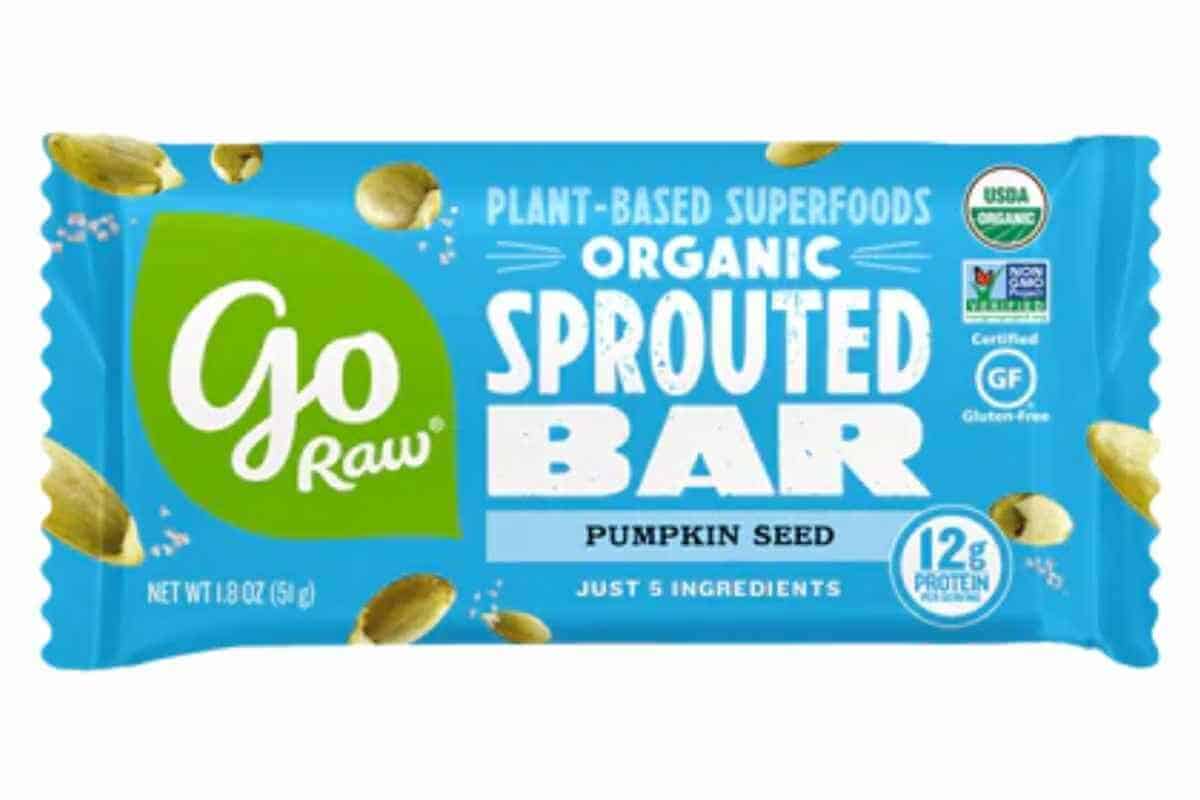
Go Raw makes a variety of products made with sprouted grains. Sprouted grains are processed just after germination making the amount of certain nutrients higher. They are also lower in starch which may help people who are sensitive to digesting grains.
The Sprouted Pumpkin Seed Bar is made with minimal ingredients (pumpkin seeds, sprouted flaxseed, dates, agave nectar, and sea salt). One bar has 270 calories - the highest calorie bar in this lineup (which isn’t necessarily a bad thing!)
These protein bars are free from gluten, peanuts, tree nuts (except coconuts), dairy, soy, eggs, fish, and shellfish. However, they are made on shared lines with sesame. I reached out to Go Raw who told me they conduct deep cleaning and allergen swabbing between runs to ensure no cross-contact.
- Products available: Pumpkin Seed Sprouted Bars.
- Free from: gluten, peanuts, tree nuts, dairy, soy, eggs, fish, and shellfish.
- Contains: No common allergens. The company makes other products that contain coconut and sesame and they are made on shared lines. The company’s website says that they conduct deep cleaning and allergen swabbing between runs to ensure there is no cross-contact.
- Protein source: pumpkin seeds
- Nutrition notes: Each bar has 270 calories, 16 grams of carbohydrates, 5 grams of fiber, 2 grams of added sugars, and 12 grams of protein.
Where to buy: Shop at GoRaw.com or Amazon.
No Nuts! Energy + Protein Bars
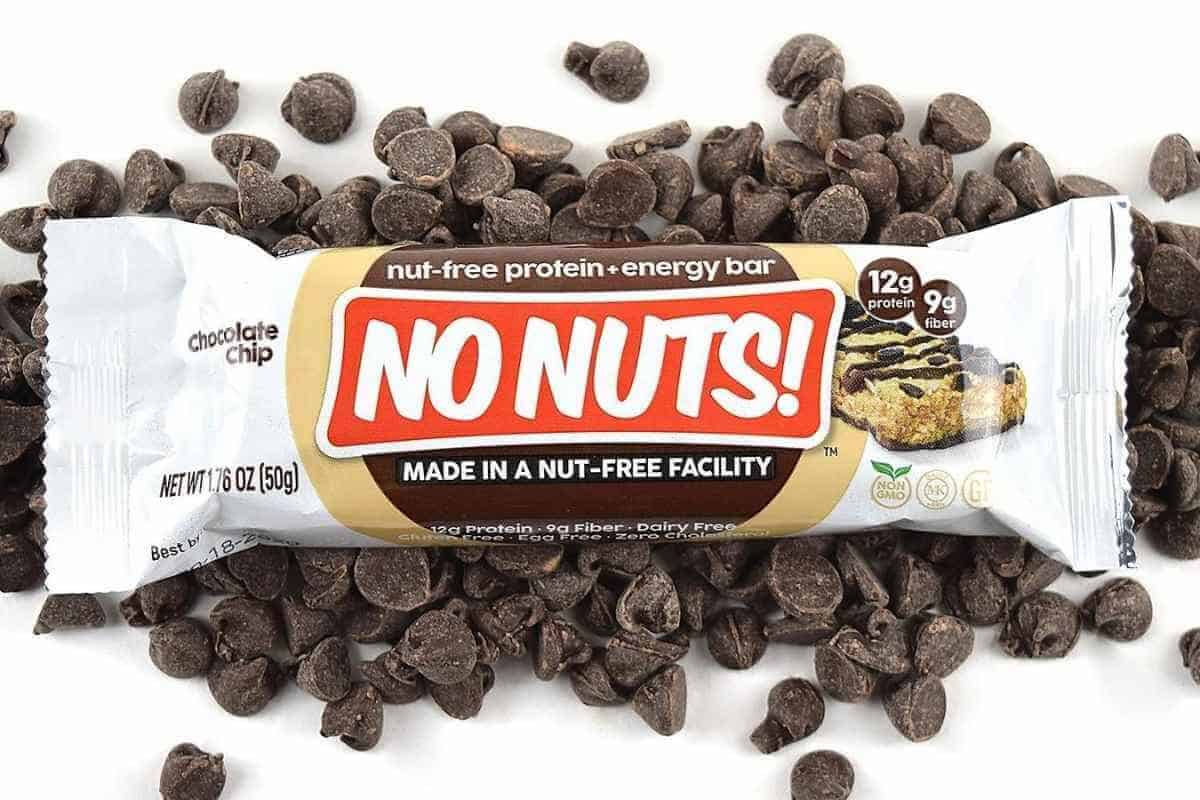
No Nuts! Energy + Protein Bars are made in a certified nut-free and gluten free facility and are also free from eggs and dairy.
According to the company’s FAQs, the bars are made by mixing the dry ingredients first, then combining with liquid ingredients that have been mixed at a boil. This creates a balance of chewy and crunchy textures.
Unfortunately, these bars are not suitable for those with soy and pea allergies as these are the main sources of protein.
- Products available: Four protein bar varieties including chocolate chip, lemon crème, blueberry & vanilla, and caramel mocha.
- Free from: Peanuts, tree nuts, dairy, eggs, wheat/gluten, fish, shellfish, sesame
- Contains: Soy. Made in a facility that processes coconut and sesame.
- Protein source: Soy protein isolate, pea protein, and sunflower butter
- Other nutrition notes: Each bar has about 190 calories, 28 grams of carbohydrate, 9 grams of fiber, 6-8 grams of added sugars, 12 grams of protein
- Protein sources: Soy, pea, and rice protein
Where to buy: Shop at Nonuts.com or Amazon (affiliate links).
Recipes for nut free/allergy friendly snacks
If you prefer to DIY your nut free snacks, these are a few ideas that you can make right now!
I especially love to make the nut free granola bars and no bake energy bites before a road trip because they travel really well.
In summary
Combining protein, carbohydrates, and healthy fats in a bar makes a healthy and satisfying snack that has staying power.
While many protein bars are made with nuts and other common allergens, nut free protein bars (that are also free of common allergens) do exist!
And one final note, be sure to always read labels carefully every time you buy a product as ingredients change often!
What is your favorite nut free protein bar? Did I miss any? Let me know in the comments!
- Chocolate Chip Cookies (Gluten Free, Dairy Free, Egg Free) - February 17, 2024
- Dairy Free Mashed Potatoes {Stovetop OR Instant Pot} - December 16, 2023
- Are Candy Canes Vegan? - December 10, 2023

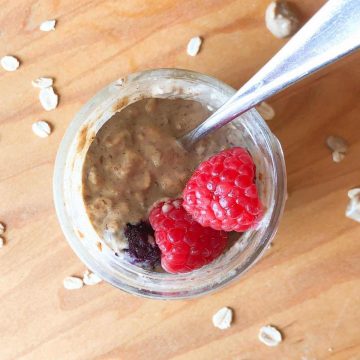
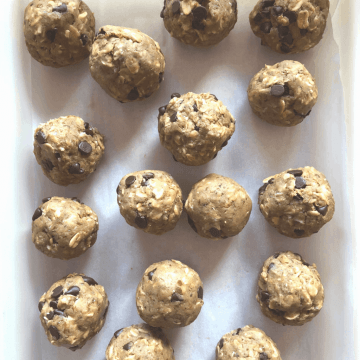
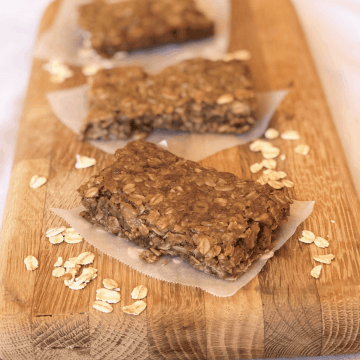
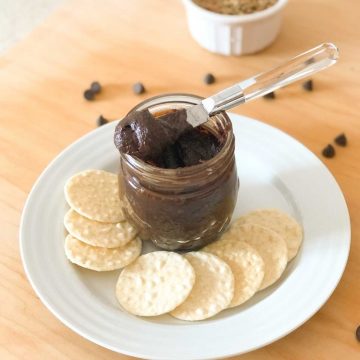

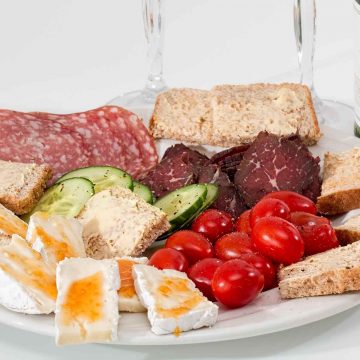


Missy V says
Thanks for outlining these options, really appreciate it! I was researching this tonight and was happy to come across an article from you, Kristi! We've been buying the Made Good granola bars but they only have 2g of protein and my teenager needs more! I'm going to order the 88 acres and No Nuts options you listed (I haven't heard of the No Nuts one before). Thanks again! 🙂
Kristi Winkels, RDN, LD says
Hi Missy! Glad you found the post to be helpful!